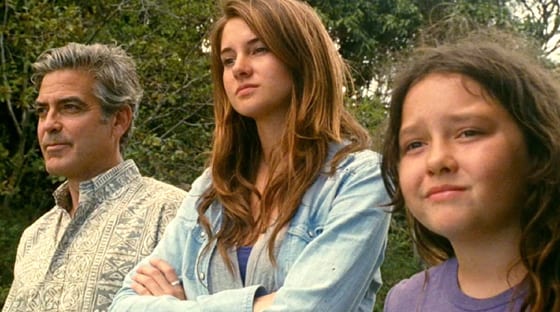*Warning: Mild spoilers about The Descendants*
They live with us and see us at our best and our worst. They note when we’re curled up in a ball and ill, and when we’ve just gotten up in the morning, cranky, because we haven’t yet had our requisite cup of java. They witness our behavior when we’re happy and, in our lightness of heart, embarrass them by singing aloud all the wrong lyrics to pop songs, but only after having had that cup of java.
Aside from their ordinary, daily observations, do children ever truly get to know who their parents are? When parents attempt to shield their offspring from adult disappointments, fears, desires and their own character flaws are their children then prevented from knowing who their parents are as people, rather than just their caretakers?
Why all these existential questions? Well, in the span of one week, I finished reading Aimee Bender’s fascinatingly weird book The Particular Sadness of Lemon Cake and saw the new film The Descendants starring George Clooney, who sported a series of really ugly Hawaiian shirts.

Both the book and movie prompted me to ponder whether my husband and I allow our children to see who we really are, and whether complete parental honesty is a good or bad thing.
First, the book, which I gobbled up quicker than my Thanksgiving turkey and stuffing, and not just because there was a picture of scrumptious looking slice of cake on the cover.
The Particular Sadness of Lemon Cake follows Rose Edelstein through the years, starting when she was 8 years old and she became aware that she had the power to discern the emotions of the people who prepared her food and what they were feeling when they handled the food. For example, if the person who whipped up the lasagna at the school cafeteria was angry, she’d taste the anger. If the folks who picked the lettuce in the fields were mistreated, she could tell. Ditto for the animals, and if they were free range and happy or not.
Most disturbingly to young Rose, though, was the fact that when she ate a slice of the lemon chocolate cake that her mother had made especially for Rose’s birthday, she gagged on it because all Rose tasted on her tongue was despair and the dark, desperate feelings that she had no idea that her mother was secretly carrying around inside of her. Rose was astonished at the depths of her mother’s melancholy. This knowledge ate away at her and worried her immensely. Consuming fare prepared by her emotionally distant father or her disturbed older brother was likewise unbearable for her as the feelings were too weighty for her to shoulder. By comparison, Rose’s heart ached when she sampled a friend’s lunch and she detected love and contentment, sentiments which were absent from her family’s meals.
This got me to thinking about occasions when I’m stressed out or worried. Other than when I’m irritable or outright hollering, are my children able to sense, even without Rose’s superhuman feelings detector, what’s really going on inside my head, inside my heart, inside my upset tummy? Or are they clueless, like Rose initially was about her own mother’s unhappiness until she ate a slice that cake? Which is better, for a kid to know or not to know?
Then I ventured out to the theater to see The Descendants whose premise is as follows: After his wife Elizabeth was seriously injured in a boating accident and was in a coma, Matt King (Clooney) discovered that Elizabeth had fallen in love with another man and was planning to ask the super-busy, workaholic, distant (sensing a trend?) attorney Matt for a divorce. Elizabeth’s best friend angrily told Matt that Elizabeth was miserable in the marriage and asserted that Matt had been phoning it in for some time. Elizabeth, her best friend said, longed for happiness and closeness, for things Matt had been unable to provide. And Matt never saw it coming. (Too bad he didn’t have Rose’s taste-fueled feelings sensor.)

Their teenage daughter Alex found about the affair shortly before the accident and had a hard time overcoming her anger with her comatose mother.
In most of Alex’s scenes, she was raging at the world and swore like Tony Soprano, regardless of who was within earshot, even her little sister. Was Alex angry because she knew about her mother’s actions, because she wished she didn’t know, or both?
Meanwhile, Matt and Elizabeth’s grade school-aged daughter Scottie was completely in the dark about the affair (and how it weighed on her dad and sister) and had no idea that her mother had been so unhappy. As the heartbroken and befuddled Matt tried to make his own peace with his wife’s infidelity — as she lay there, unconscious, in a hospital bed just when he wanted answers from her — Matt struggled to keep his pain away from Scottie and, to some degree, from Alex.
Elizabeth deftly hid her affair and her sorrow from her children and husband, just as Rose’s mother did in Particular Sadness. Matt, Alex and Scottie all thought they knew Elizabeth and what she would or wouldn’t do. And Rose had believed she knew her mother too, until she had that fateful bite of cake and learned about her mother’s concealed, rocky inner emotional terrain.
Would it have been better to have been open and allowed the kids understand everything that was going on, to let them take a peek at their parent’s discontent and learn the lesson that life’s not always rosy? I’m not sure that that’s a better option. For a child to know about a parent’s adult struggles might result in making the kid feel unsafe when he or she is simply looking to be protected and loved. Yet to suddenly have the rug pulled out from under a child, without warning, if a parent who’d seemed all fine and content suddenly leaves or the child learns that a parent had been fooling everybody and having an affair, doesn’t that do a number on a kid too? When it comes to parents’ complicated emotional lives, it’s hard to know what’s the best route to take.
I’m just glad that none of my kids have the power to read my emotions when they eat a slice of my apple pie . . . at least I don’t think they do.





